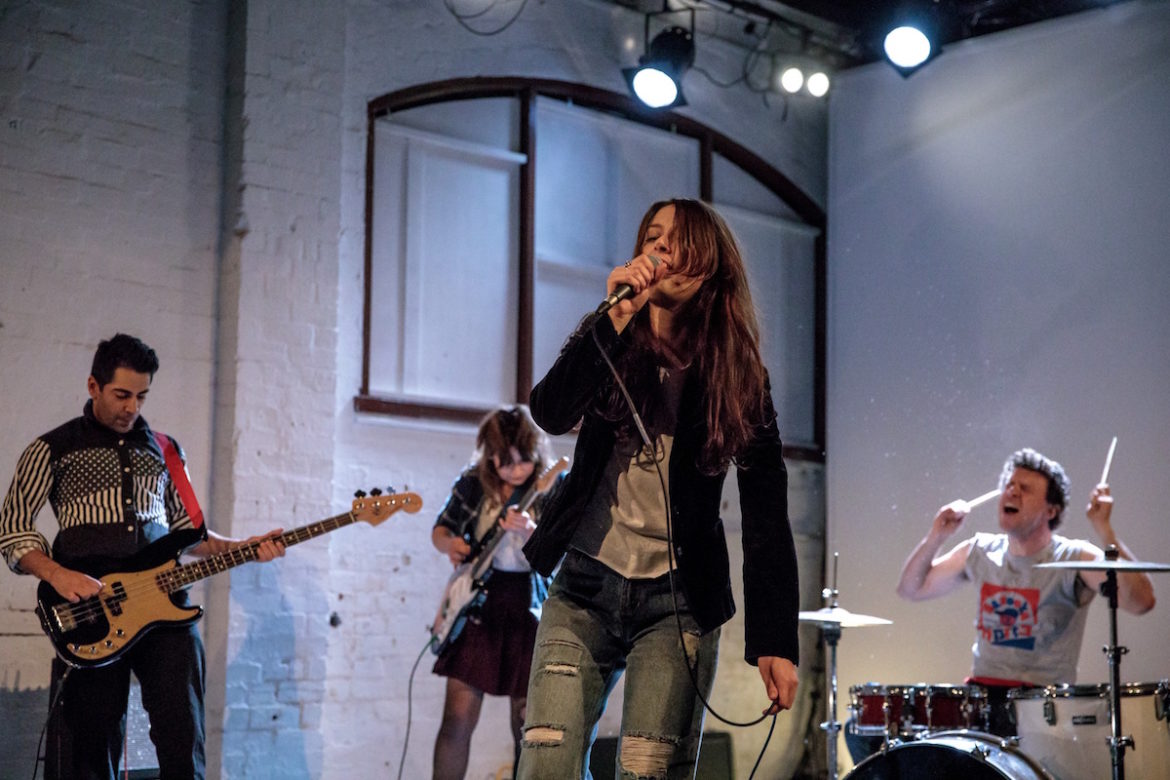“Nostalgia for the days when falling in love and starting a band and saying fuck the world meant something. Meant everything.” Robert Reid on Elbow Room’s Prehistoric
Brisbane (Security City). It’s late 1970s Queensland with the Lockdown, the Taskforce, Joh and The Saints. There weren’t nearly so many pumpkin scones as you might expect.
Elbow Room’s Prehistoric is part garage band rehearsal, part coming-of-age share house drama. The four nascent band members, Deb Station (Brigid Gallacher), Nick (Sahil Saluja), Pete (Zachary Pidd) and – best punk name ever – Rachel Privilege (Grace Cummings) are not only adorable taking their punk band baby steps but, as the Pink Monkeys, they’re also a half-decent band that I could easily imagine in my record collection.
They’re four bored kids drawn together by Rachel, who has returned home to Brisbane after two years in Sydney. Deb takes the role of narrator for much of the play, talking us into how the band got together. How Rachel finds the others, drunk at a gig before it’s shut down by the Taskforce. The band who all end up crashing on Deb’s couch, learning to play their instruments as they learn to be a band and to be people.
The boys are good comic relief: Pete’s enthusiasm and Nick’s awkward nervous energy both charm the audience instantly. They’re very funny. Pete can hammer a solid beat out of that bare kit and Rachel sings with an unsteady stage presence and booming voice that recalls Nick Cave on Release the Bats. In the Stables at the Meat Market it feels like any number of crappy rehearsal venues, scout hall gigs and squat housing in the city.
Oh to be young and feel love’s keen sting.
Nostalgia. Deb warns us that she’s about to commit an act of nostalgia. It’s a bit late, we’re half an hour into an giant act of nostalgia already. Not just nostalgia for Brisbane in the 70s, not just nostalgia for a punk Australia, a young, white Australia feeling its rebellion; nostalgia also for being a teenager or in your early twenties. Nostalgia for the days when falling in love and starting a band and saying fuck the world meant something. Meant everything.
These are the great days of self-mythologising, when everything seems possible and destiny whispers promises in your ear that it will not keep. The days before you realise that the rage of wild youth – the riots and gigs and protests – are systemic pressure-release valves that developed to maintain just enough revolt without becoming a revolution.
The actors step in and out of character to address the audience throughout. The story of the band is told from now. The performance is at pains to remind us that this is now and that was then. It reminds us immediately, with an acknowledgement of country, how much things have changed. That such a procedure honouring the ancestors of the traditional owners of the land certainly didn’t exist in 70’s Brisbane Likewise, transgender and non-binary identification didn’t exist for the characters the way it does now, though the actors can step out of the show to comment on it, to remind us of the context, historical and contemporary, in which we watch.
Being able to step out of the world of the characters gives the story a lot of the political context that’s needed to understand the pressures and threats facing the band. These are things that the characters just know, there’s no one amongst them who needs to told that the cops will bust up a gig because its an illegal gathering. The people who need to be told are sitting in the audience so, rather than awkward expositional writing, the text just drops all pretence and tells us what it needs us to know. It also allows the play to sidestep any of the heavy scenes: the crisis points of emotional risk between two people, the brutality of police beatings, even the faces of the threatening voices that come from outside the band, all happen in darkness or with their backs turned. Which, of course, is how a police state operates.
And there are lots of little Easter eggs for Australian punk fans of the era. The play drops names like The Saints, The Slits, Razar and Triple Z radio. There is a soundtrack of Saints classics – (I’m) Stranded. Know your product, This Perfect Day – that punctuate the archetypal “lets start a band” stories that come together in Prehistoric like an Australian backbeat. In the background of the rise and fall of the Pink Monkeys is the story of The Saints, the Australian punks who were so punk they couldn’t even be bothered to dress up to be punk.
Prehistoric is a history lecture set to music told like a teen soap opera. It dwells on dark politics, the shadows and abuses of authority that lurk snarling within them. Trying to come to terms who with who you are is close to impossible when the language you might use to describe yourself is denied to you, and the Pink Monkeys break up like all good punk bands, after a police raid where everyone gets their heads kicked.
Oh to be young and feel love’s keen sting.
Prehistoric, written and directed by Marcel Dorney. Lighting design by Kris Chainey, design by Joe Noonan, sound and composition by Marcel Dorney and Steve Toulmin. Performed by Brigid Gallacher, Sahil Saluja, Zachary Pidd and Grace Cummings. Elbow Room at the Meat Market, until July 27. Bookings
Access: Meat Market is wheelchair accessible but cobblestone floors can create a bumpy surface. For details on accessibility at the Meat Market, go to this page.

